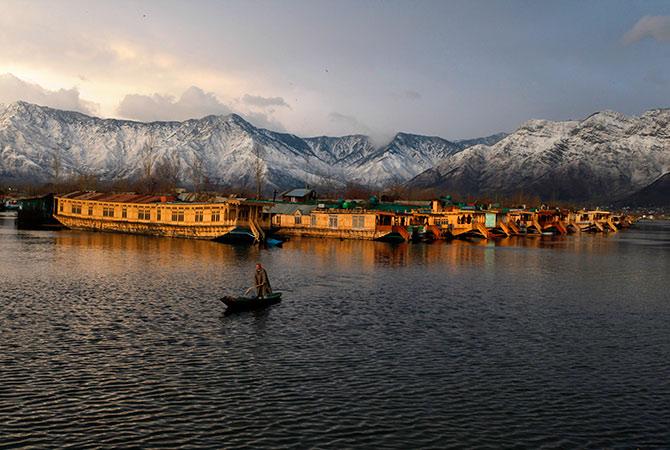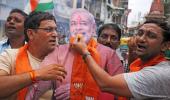'The "anger and alienation" of the youth may increase. The government's answer to this propensity is development.
'But that, too, takes time.
'For the present, how the scene pans out once the present restrictions on assemblage and the Internet are lifted will be keenly watched', points out Amulya Ganguli.

Of the three issues which Atal Bihari Vajpayee put on the backburner in 1996 -- Ram temple, Article 370 and the uniform civil code -- his present-day successors have summarily dispensed with the second.
The Rashtriya Swayamsevak Sangh had wanted to adopt a similar bulldozing approach towards the temple just before the last general election because of the belief that the Bharatiya Janata Party might not fare too well if it didn't raise an emotive issue.
The paterfamilias of the saffron brotherhood wanted, therefore, the beginning of the construction straightaway without waiting for the Supreme Court verdict.
But the BJP decided to tread carefully.
It is not known whether the party's present gung-ho muscularity vis-a-vis Kashmir is the result of any advice from the RSS.
But there are two probable reasons why it has decided to rush in where angels fear to tread.
One is not only the BJP's majority in the Lok Sabha (which some felt should be used to usher in "big bang" reforms), but the party's success in bolstering its numbers in the two Houses of Parliament by roping in several non-NDA parties.
The other and perhaps more important reason is the economic downturn.
The BJP may have succeeded in winning the general election by beating the nationalist drum which diverted attention from the economic malaise.
But it cannot continue to do so -- at least not in the manner which it did in the run-up to the polls.
It needed a new drum.
The temple could have been one as the RSS thought.
But judicial intervention has complicated matters.
So the axe fell on the other option among the three issues in the Sangh parivar's core agenda -- Article 370.
The BJP must be sure that the resultant hullabaloo will ensure that no one talks of the economy for the time being.
Instead, all attention will be focussed on the new Union territory whose residents and the local political parties will have a hard time framing a cogent response to an unexpected development.
Pakistan, too, will be flummoxed, but that is another story.
As the queueing up of the BJP's "B" team comprising the Biju Janata Dal, the BSP, the YSR Congress, the Telugu Desam and a few others as well as the confusion in the Congress shows, the BJP currently has the upper hand.
But politics is a game of long-distance runners.
Will Kashmir remain a "heaven on earth", as Amit Shah has said?
As an army general told a television channel, the "anger and alienation" of the youth may increase.
The government's answer to this propensity is development.
But that, too, takes time.
For the present, how the scene pans out once the present restrictions on assemblage and the Internet are lifted will be keenly watched.
Much depends on the two mainstream political leaders of the state -- sorry, Union territory -- Mehbooba Mufti and Omar Abdullah.
Will they be able to defuse the situation if there is any violence?
Among the national parties, the Congress has to shoulder an enormous responsibility -- along with the parties in its gharana, the Trinamool Congress and the Nationalist Congress Party -- at a time when the BJP is ingesting both individual MPs and MLAs and a few political parties.
The best course for the Congress and its allies will be to advise restraint and wait for judicial intervention.
Amulya Ganguli is a writer on current affairs.










